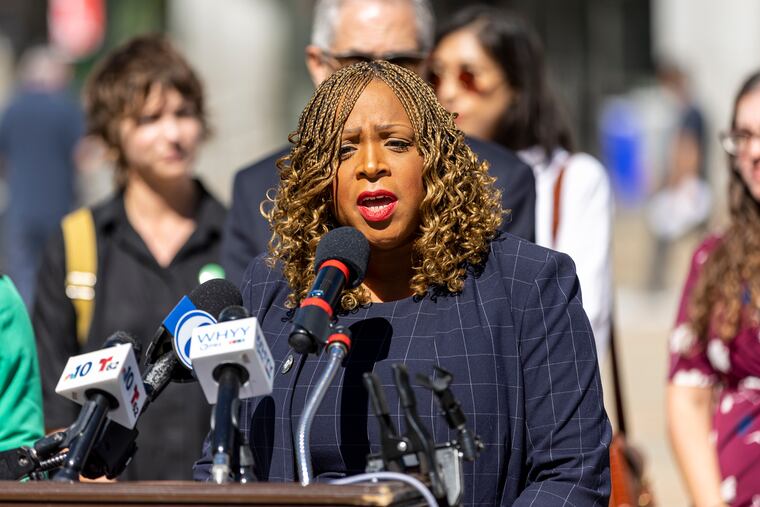Philly City Council members are backing a $72M plan to address quality-of-life issues
The proposed budget increase would help the city enforce illegal dumping violations, clean abandoned lots, and calm traffic on unsafe streets.

Nearly every member of Philadelphia City Council last week backed a plan to invest an additional $72 million for the city to combat quality-of-life issues, a proposal that could become a key tenet of budget negotiations taking place this month.
City Councilmember Jamie Gauthier, who represents West Philadelphia’s Third District, authored the budget amendment, which includes funding to improve code enforcement, secure abandoned lots, and address illegal dumping. The largest chunk of money is $37 million to improve traffic safety, specifically around schools and day cares.
“These are not extras or a cherry on top,” Gauthier said in an interview. “These are core, basic services that the city should be able to provide well to keep neighborhoods feeling and looking good, and to let residents know that we care.”
Gauthier said every Council member signed a letter to Council President Darrell L. Clarke in support of the proposal. Clarke is in the midst of negotiations with both members and Mayor Jim Kenney’s administration, and the parties must hammer out a budget agreement by the end of the month, when the current budget expires.
In March, Kenney proposed a $6.1 billion budget that Council leaders predicted would sail through the legislative process. It is Kenney’s final budget before he leaves office in January at the end of his second term. Philadelphia mayors are limited to two terms.
Democrat Cherelle Parker and Republican David Oh, both former Council members, are running to replace him. Parker, who made cleaning and greening the city a key part of her primary campaign, is heavily favored to win given Philadelphia’s strongly Democratic electorate.
This season is also the final budget process that will be steered by Clarke, a mainstay in City Hall for decades who is retiring at the end of the term. Several members jockeying to replace him may see the budget agreement as a way to flex their muscle or test their political influence.
» READ MORE: Last year's budget committed millions to combat quality-of-life issues, but critics said it was not enough
Kenney’s proposal included some additional investments in quality-of-life issues and improving the delivery of bread-and-butter city services. It calls for a $2.5 million infusion to expand street sweeping and a $4 million line item to create an additional crew to clean up sites plagued by illegal dumping.
Council’s proposal goes further. Gauthier is asking the city to commit nearly $9 million more to address illegal dumping, an amount she says could fund six additional crews. The proposal also includes:
More than $10 million in funding to clean and secure vacant lots, both those that are privately and publicly owned.
More than $10 million to improve code enforcement by increasing salaries and hiring more building inspectors, as well as adding 100 additional vehicles to the city’s fleet.
Nearly $1 million to expand the Law Department’s code enforcement initiative, specifically to hold illegal dumpers accountable in court.
A spokesperson for Kenney’s administration did not respond to a request for comment.
Gauthier, a progressive poised to win a second term on Council this November, said she sees the investments as an antiviolence initiative, saying blight and nuisance businesses attract crime. She said it’s particularly “unacceptable” that blighted properties across the city are owned by the municipal government.
This is the second year Gauthier has led the charge for new investments to address quality-of-life issues. Last year, her campaign called #JustServicesPHL resulted in millions of new funding to remove abandoned cars, fix broken streetlights, and crack down on illegal dumping.
But critics said it was not enough to combat what they see as an uneven delivery of services that disproportionately affects communities of color.
“We’ve seen some improvements,” Gauthier said, “but we know that much more needs to happen.”